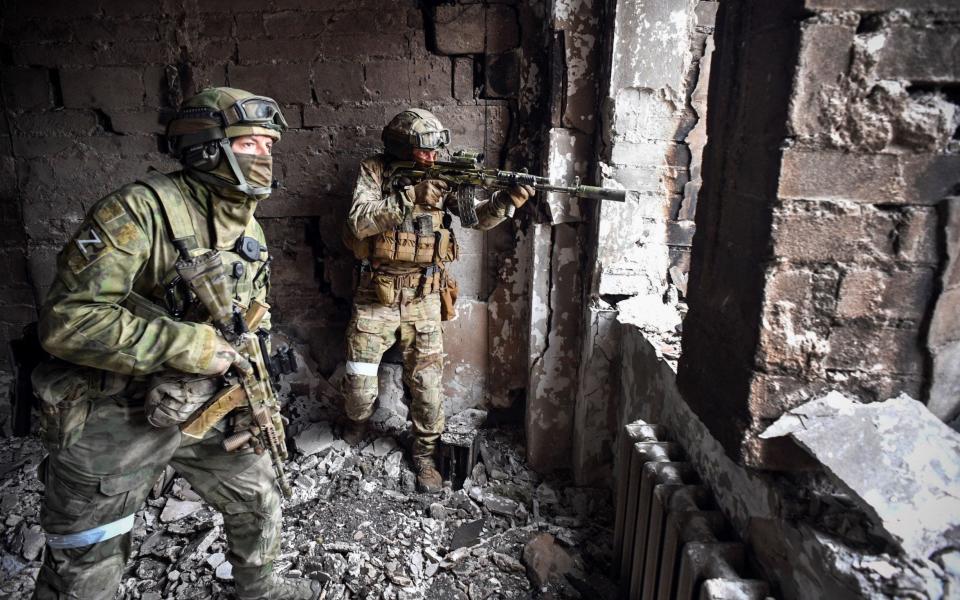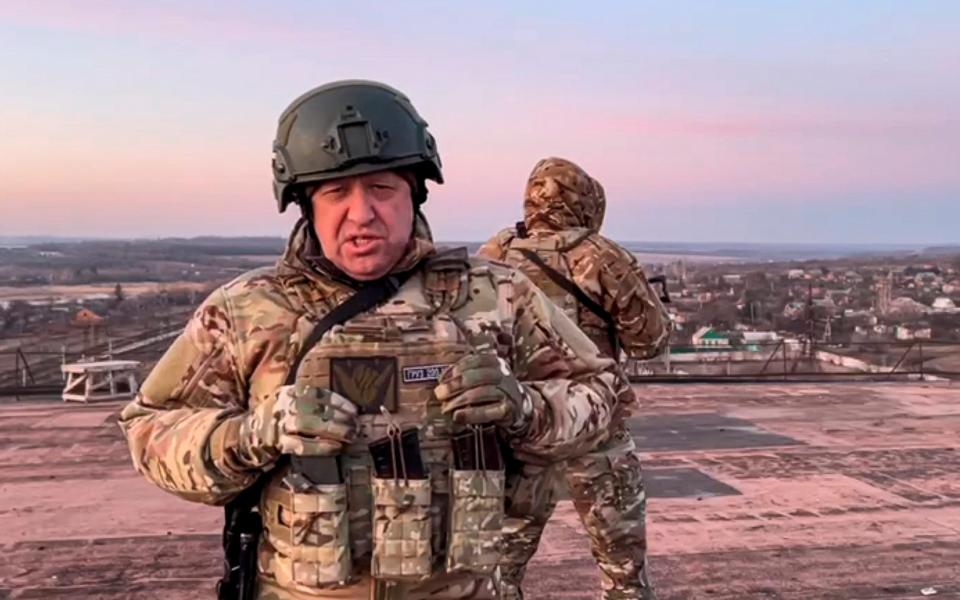New Russian army unit sent to find soldiers lost in chaos of faltering offensive

Russians sent to fight on the front lines are mutinying, fighting amongst themselves, getting locked in basements and lost in the chaos of a faltering offensive, a flurry of videos and messages from inside Vladimir Putin’s army show.
Recently mobilised soldiers are refusing orders to face “certain death” by joining “human wave” attacks that they say are destroying entire units at a time.
Some are appealing directly to Putin in desperate videos, while others are standing up to Kremlin officials sent to quell the rebellion.
Reports are emerging of fighters being locked underground for declining to become targets in the “shooting range” that has become the front line.
Meanwhile the Russian army has been forced to create a new unit to round up all the “lost” soldiers deserting, fleeing or struggling to find their teams.
Soldiers from at least 16 different regions recorded video messages since early February to blame commanders for trying to use them in “human wave” attacks, according to a tally by Russian media outlet Verstka.
The Russian tactic of sending “human waves” of poorly trained and poorly armed fighters into the line of fire to overwhelm the opposition has become increasingly common, according to military observers.
The appeals come as the Ukrainian forces are reporting staggering Russian losses - between 590 to over 1,000 men a day. Russia’s long-awaited offensive is largely considered to have stalled amid a gruelling battle to take the small city of Bakhmut.
One of the most striking recent calls for help from soldiers came from a group of men who were called up from eastern Siberia’s Irkutsk region.
The man said he and his comrades were sent to the occupied Donetsk region, ostensibly to be a patrol force only to find out they were to join a now notorious human wave attack outside the town of Avdiivka that have been overwhelming the Ukrainian army.
“We’re just sent in for slaughter. The commanders are telling us in the face we’re disposable soldiers and our only chance to go back home is to get injured in fighting,” the soldier said.
“The commanders don’t care about our lives. We’re asking for help. We have no one else to turn to.”
A large number of complaints are likely to be connected to Russia’s offensive outside Avdiivka just like a previous wave of discontent in October and November came hand in hand with Russia’s attacks outside Vuhledar and Kreminna, according to Ruslan Leviev, head of open-source group Conflict Intelligence Team that has been tracing Russian troops since the first Russian incursion in Ukraine in 2014.
“We don’t know how much of this discontent is left unpublicised but those videos most likely speak to the use of ‘human wave attacks’ widely reported by the Ukrainian army,” Mr Leviev told The Telegraph.
Soldiers often hide their faces behind balaclavas and rarely speak to reporters, fearing that publicity would backfire against them or their families.
In another widely shared video, filmed in pitch black darkness, a Russian man with his camouflage jacket over his head can be seen reading out from a piece of paper, lit by a torch sitting in his lapel pocket:
“Vladimir Vladimirovich [Putin], this is a plea from men mobilised from the Irkutsk region. We’re asking you to look into the illegal and criminal orders of our commanders and take action,” the man says, asking Putin to stop sending former civilians like him to their deaths.
He says the unit of his predecessors who made a similar appeal was “almost completely wiped out”.
After four pleas from the 1439th regiment, the men’s female relatives recorded a desperate video last weekend, asking Putin, “our only hope” to “save our men”.
“The commanders have abandoned them and told them not to leave their positions. Our men have been without food or water for a few days but surviving under constant shelling,” the women who crowded on a beige couch in a sparsely furnished living room, said as one of them covered her face with a shawl, crying.
In response, Russia’s defence ministry released a video of a masked soldier who said he was from Irkutsk and that he was willing to serve.
People of Baikal, an Irkutsk media outlet in exile, was able to trace the men’s relatives after they posted desperate pleas on local social media groups that were subsequently deleted.
The wife of one of the men who recorded the appeal called him a “patriot who respected Putin and thought he was doing everything right in Ukraine”.
The woman’s husband, who was called up in September and ended up in Donetsk in November, described to her the grim reality he had to face in eastern Ukraine.
“(The commander) was sending them for slaughter: People were shot and killed like at a shooting range. The guys were all alone in a minefield, without any air support or any reinforcements,” the wife, whose identity was concealed, said.
Reports about an utter disarray in the Russian ranks have been pouring in even from pro-Kremlin sources.

Rybar, one of Russia’s most popular pro-war Telegram channels, earlier this week admitted in a lengthy piece that the country’s army faces the problem of soldiers who “got lost”.
An unknown number of troops are wandering around the front line looking for their units after being discharged from hospital or after losing their mates in battle.
“Sometimes things get absurd: a person can go around the front line for weeks, trying to find his unit while at the same time the recruitment office already listed him as a deserter,” Rybar said, attributing it to “chaos” and a break-down in communications within the military.
The defence ministry is also working to set up special units that would be gathering up all the “lost” soldiers before figuring out where to ship them next.
Most recently, Russian convicts who were recruited to fight began to rebel as well.
Media outlet Ostorozhno Novosti earlier this week published a video allegedly showing convicts thrown in a basement outside Donetsk as punishment for refusing to follow orders.
The men said only 11 people from their unit of 71 people survived.
“The defence ministry should be aware and responsible for us but maybe they have no idea,” an unidentified man said.
First, it was the notorious private military contractor Wagner, owned by former convict Yevgeny Prigozhin, that began recruiting convicts at Russian prisons but at the end of last year Russia’s defence ministry reportedly pushed Wagner aside to take its place.
“The military have no idea how to deal with these people,” Olga Romanova, head of the prisoner rights group Russia Behind Bars, told The Telegraph.
“You can imagine a group of prisoners, in their 30s and 40s, some of them repeated offenders, often convicted of violent crimes, who have very poor social skills and vague ideas about military discipline - and they get some young officer straight from military college as their commander.”

In arguably the most desperate appeal to date, mobilised men from 1004th regiment were seen confronting a commander who was dispatched from their native Kaliningrad to respond to a brewing mutiny.
The men, seen from the back, kept shouting at the visiting commander they have been used as “meat” and they refuse to go into attack.
“Why should I fight there? What for? Who for? They’re sending us to a sure death,” one man yelled.
“Go jail us! How much is it? 5, 7, 10? I don’t give a damn. At least I’ll get to live.”
The soldiers’ appeals also shed light on apparent friction between Russian troops and local militants in Donetsk who have been fighting against Ukrainian government troops since 2014.
The Kaliningrad recruits like the men from Irkutsk claimed that separatist commanders from Donetsk have been refusing to “waste” ammunition artillery to support them as one man said they were not given proper equipment or weapons.
“We get out there (to the front line) while (the Donetsk men) just sit around shamelessly, with all the equipment, night vision and stuff,” he said.
Mr Leviev of the Conflict Intelligence Team says the Donetsk militants who have been running low on local recruits are increasingly resentful of the Russian arrivals.

“There might be a certain grudge that DNR people were used as cannon fodder for eight years and later forced into a peace treaty - now the Russians disappointed the separatists who for eight years were hoping (Russia) would grind the Ukrainian army into dust.”
The men’s complaints echo with the UK Ministry of Defence’s report earlier this week that suggested a lack of supplies as it said mobilised reservists were sent into fight with firearms and shovels.
Officials from the men’s native regions have been trying to play down the protests, often by distributing the men to different units or sending them to the rear.
So far, however desperate the pleas are, Russia has yet to see a genuine wave of defection that would have an impact on its defence capabilities.
“Such stark appeals are still quite rare,” Mr Leviev said.
“The frequency and volume of those complaints are still not enough to get the Russian commanders to give up the tactic of human wave attacks.”


